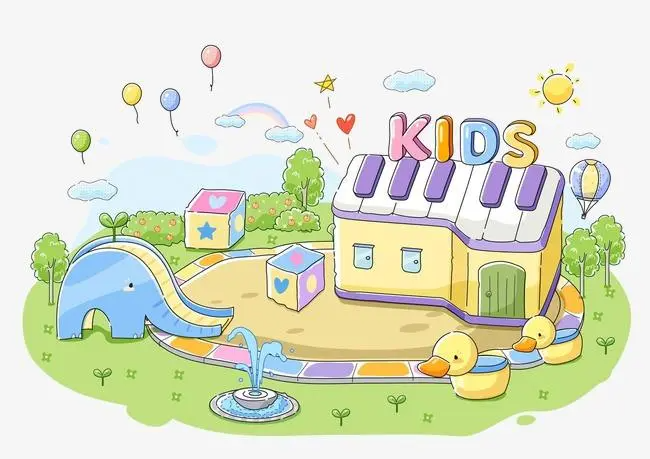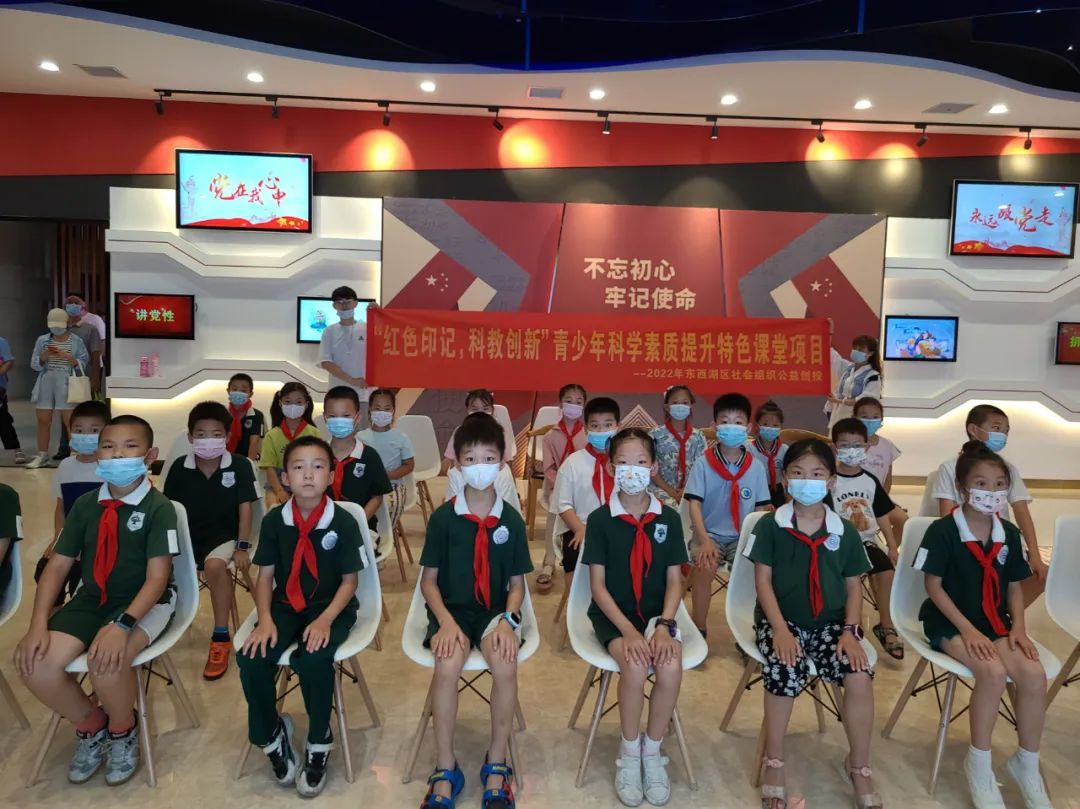What do you teach in kindergarten?This article tells you!Transfer to parents!
Author:President Kindergarten Service Time:2022.08.05
Parents often have such questions: "What exactly do you teach in your kindergarten? Is the kindergarten teacher brought the child?"
In fact, as a child's first stop from family to society, the education of kindergarten cannot be ignored.
Today we are from five areas: health, language, society, science, and art.
Look at what kind of kindergarten teaches, and how to help the promotion of elementary school (young connection) in the future.
One, society

1. Learning communication
Children around 3 years old already have a certain social experience. The kindergarten has created a good atmosphere for the child. Here it will slowly establish the concepts of "individual" and "collective". Contact, the kindergarten teacher will help children adapt to collective life through various interesting activities and games.
When you see other children playing, he can come forward to say hello, what are you doing? Instead of watching others playing silently as in the past, or talking to themselves. Learn how to solve the conflict between friends independently. Such social networking is greatly helpful for children to grow into the collective.
2. Help others
Helping others is actually similar to caring for others, helping others, to help themselves. However, this significance, children may have to wait at least until they grow up to truly understand. When you are capable of helping others, you can reach out to help those who can help themselves. Only in this way can the child be able to experience it slowly and give others timely and appropriate help. It is a very meaningful thing.

Second, health
Promote the healthy growth of children, grow taller, weighs standards, has a good body, has a certain ability to exercise, develops good living habits, has a certain ability to live, and establish confidence in adapting to the life of primary schools.
1. Living ability and habit
In kindergarten, teachers cannot pay attention to him and take care of him at the same time like parents. Teachers will teach their children to eat, go to the toilet, and dress pants through the hints of children's rhymes, games, and environment.
During the day of the event, the teacher will also teach the children some children's songs to help develop good hygiene habits.
2. Exercise
The kindergarten guarantees that the child's exercise time is not less than 2 hours a day. Even if it encounters the wind and rain, it will also allow the child to exercise in the room. The purpose is to enable the child to be healthy and physical coordination.
In addition to exercising big muscles, children can also exercise their hands flexibility through games. Teachers will choose materials with different difficulties to help children according to each child's development level. This is also a early exercise for writing in the future.
3. Protect yourself
Children must learn to protect themselves in their ability to live independently. For example, when eating and drinking water, pay attention not to hot yourself. For example, you should pay attention to your own safety when playing with children. Do not participate in games with dangerous movements. When you feel danger, you must learn to call the teacher to save each other.
There is also a time when the teacher and the parents are not found outside the kindergarten: do not talk to strangers, do not let strangers take themselves away, do not eat or drink things given by strangers. Remember the parent's phone number, and find reliable people (such as uncle police) for help. In short, it is also very important to learn to protect yourself.

Three, language
Children can listen, express, develop reading habits, and prepare for writing after entering elementary school.
1. Listen and say
The kindergarten teacher will perform the charm of the language through a painted story performance, and at the same time, it will put simple materials, such as puppets, small theaters, small stage and other props to let children use their own language and form to express their ideas.
2. Reading and writing preparation
The reading book reading in the kindergarten is only a part. After reading it, the teacher will open various games, such as manual, creative art, performance, etc., so that the reading is recorded in the child's heart.
Regarding children's writing problems, teachers will use the game to trigger children's interest in writing, enrich writing experience, cultivate writing skills and habits, and prepare for formal writing and writing in the elementary school stage.

Fourth, science
Love nature, like to explore, is full of curiosity, and have a preliminary understanding of mathematics. In the kindergarten stage, cultivation interest is far more useful than instilling knowledge. After entering elementary school, children will make children more likely to learn.
1. Scientific inquiry
Natural corners will be arranged in the kindergarten class, allowing children to grow plants by themselves, observe the daily changes of various small animals, and constantly discover and think. Teachers will also encourage children to design game experiments by themselves, record the experimental effects, and truly explore, discover and practice.
2. Mathematical cognition
The kindergarten class has a piral district and mathematical zone, which contains various mathematical enlightenment toys made by teachers. It can exercise children's mathematical thinking and cultivate interest in learning. Oh!

Five, art
In the influence of beauty and art, they can sing and dance, and express themselves in various ways.
1. Feeling and appreciation
Kindergartens will create various conditions, let children feel and appreciate the works of art masters, and subtly cultivate children's aesthetic performance and creation.
2. Imagination and creation
Teachers will not easily "teach" painting. They are more inspired by children and stimulate children's imagination. Many times, painting does not require paper pen and pen, a few cotton sticks, and can create a wild work on the same wall.

6. Homes in the home, the child is better
When many parents pick up their children from school, they will buy a few snacks for their children. As soon as the children come out, they will help their children to get things, and even after returning home, they never ask their children to follow the good habits of the development of kindergartens. This approach will greatly reduce the effects of children in the kindergarten. The cultivation of habits and abilities should be a coherent process, so if parents can let their children stick to the good habits of kindergartens at home, the education of children is more effective.
1. Let your child go to bed early to eat and eat less snacks
From the weekend or holidays, most of the heads of the family will let the children go to bed late, and the snacks will be more supplied than usual, but this is not conducive to the child to develop a good routine and diet. Syndrome.
Children's habits are developed for a long time. It is best not to disrupt due to weekends or holidays, so that children can have good living habits and lay the health foundation for children for their lives.
2. Let the child do it by themselves
In the kindergarten, the children have learned their own things, but when they return home, the parents' care and distress have made many children live a life of "rice to open their mouths to reach out".
It is recommended that after returning home, parents still let their children do what they can do with their own strength, not only to cultivate their children's ability to take care of themselves, but also allow their children to accumulate self -confidence.
3. Play a game of Kindergarten with your children
Children have learned new nursery rhymes and games in kindergarten. Parents may wish to sing and play with them. While enhancing parent -child relationships, they can also consolidate their learning results and make them feel happy in the process. Increase the interest of learning.
Life is a marathon. I don't care if I take a few more steps when I start, I care about continuous motivation and ability. Parents do not want their children to lose the starting line, so they hope that kindergartens can teach more knowledge. However, education is not only taught for children's pinyin and arithmetic, but also habitual development, and ability to cultivate ... These can give children the motivation to get into the success of their lives.

The kindergarten obediently obeyed the development of children and taught them what they were used in their lives; as a parent, I also hope that you can see the efforts and majors of kindergartens. Please believe that only by family and kindergarten cooperation can you give your children the best tomorrow!
Disclaimer: This platform reproduces and indicates the source of the source. The purpose is to pass more information, which does not mean that the platform agrees with its views or confirms the authenticity of its content. We focus on sharing and respect the original. Copyright belongs to the original creators. If there is any infringement, please contact us. We will delete the content in the first time. Thank you!

- END -
Ministry of Education: Students from some local rural schools have greatly reduced children with relocation of urban schools

Ministry of Education's press conferenceCover news reporter Su YuOn June 21, the M...
The East and West Lake District launches the "please rest assured, strong country and me" red education popular science competition

On June 25, 2022, the Red Seal, Science and Education Innovation of the Social Org...